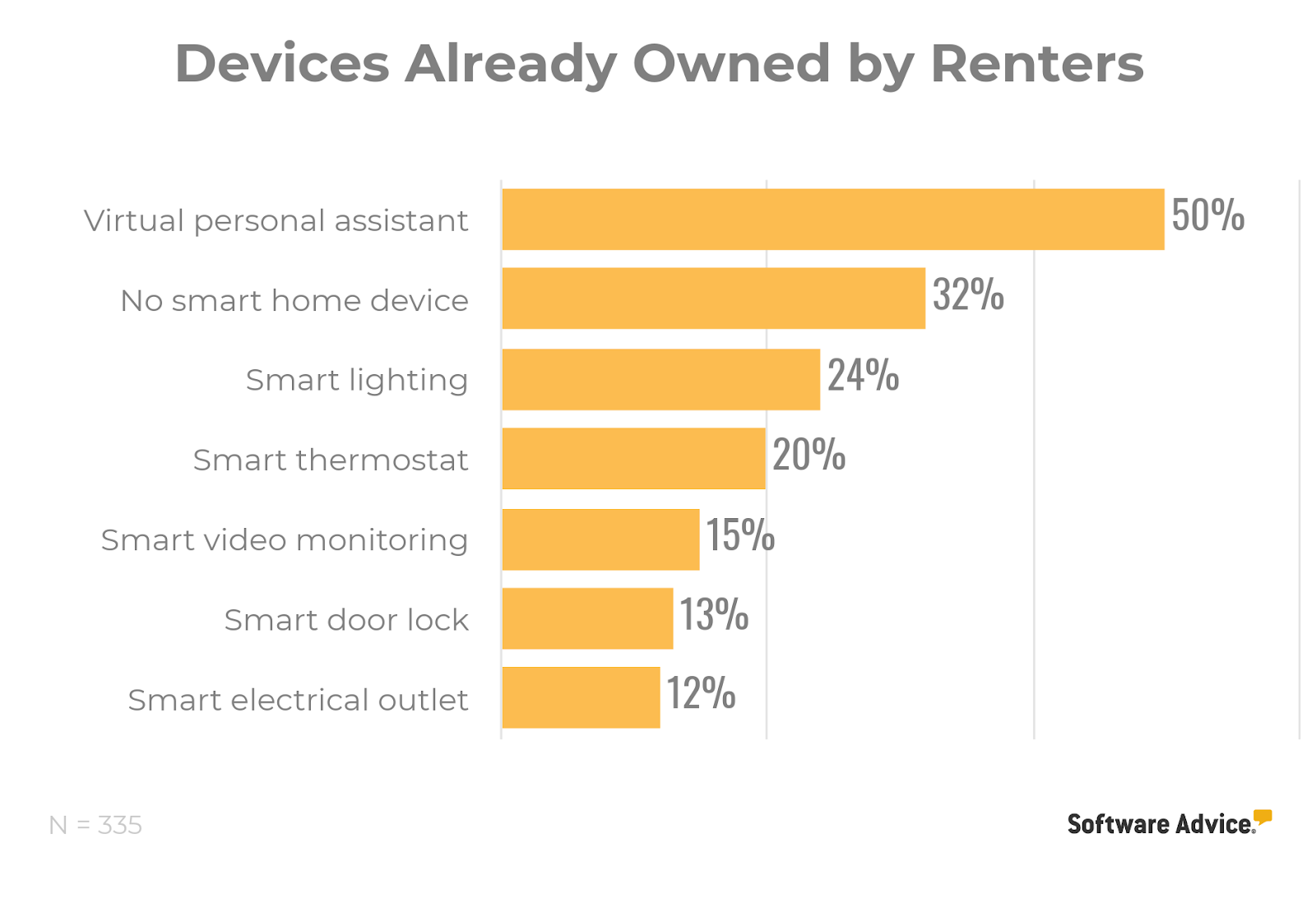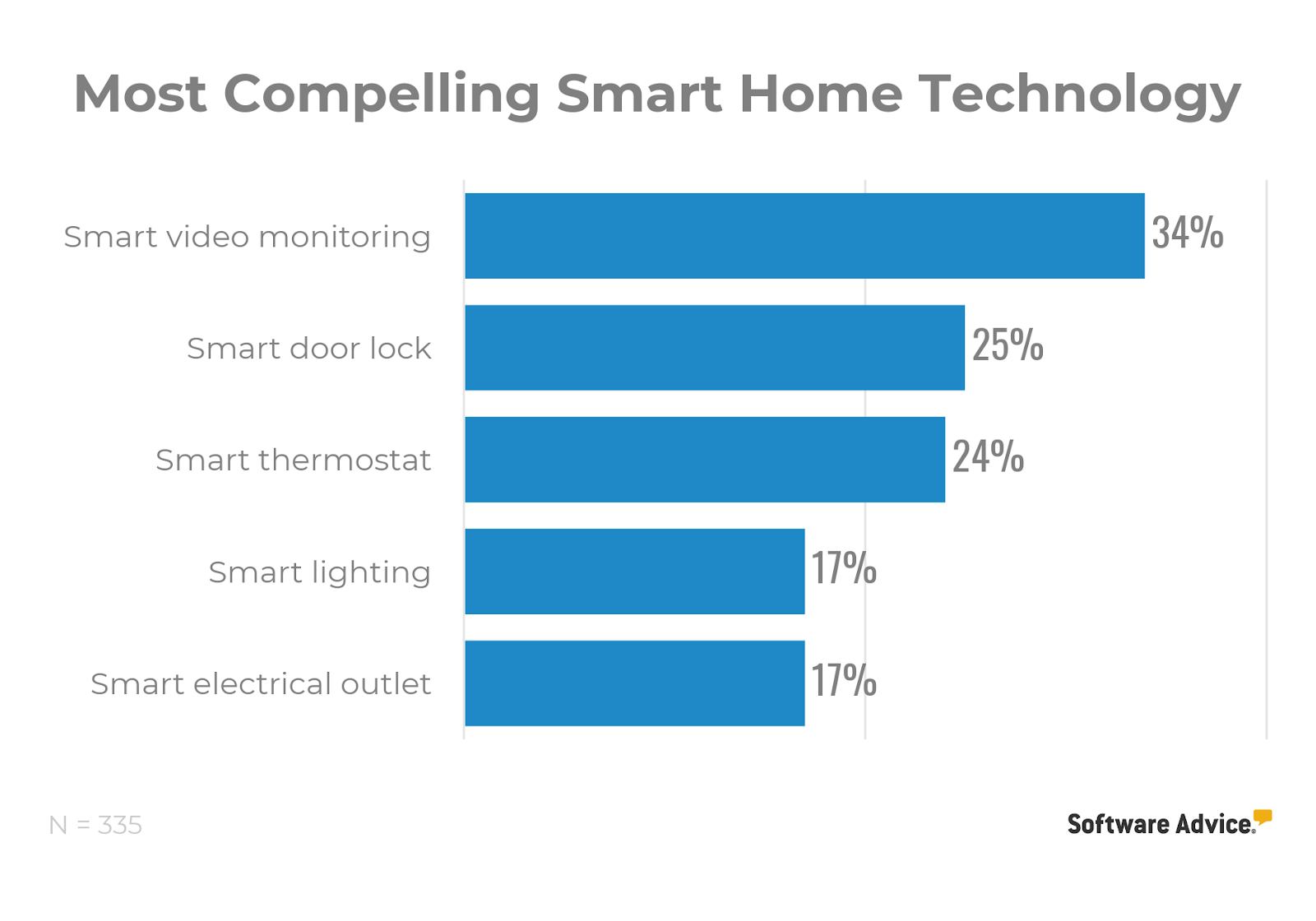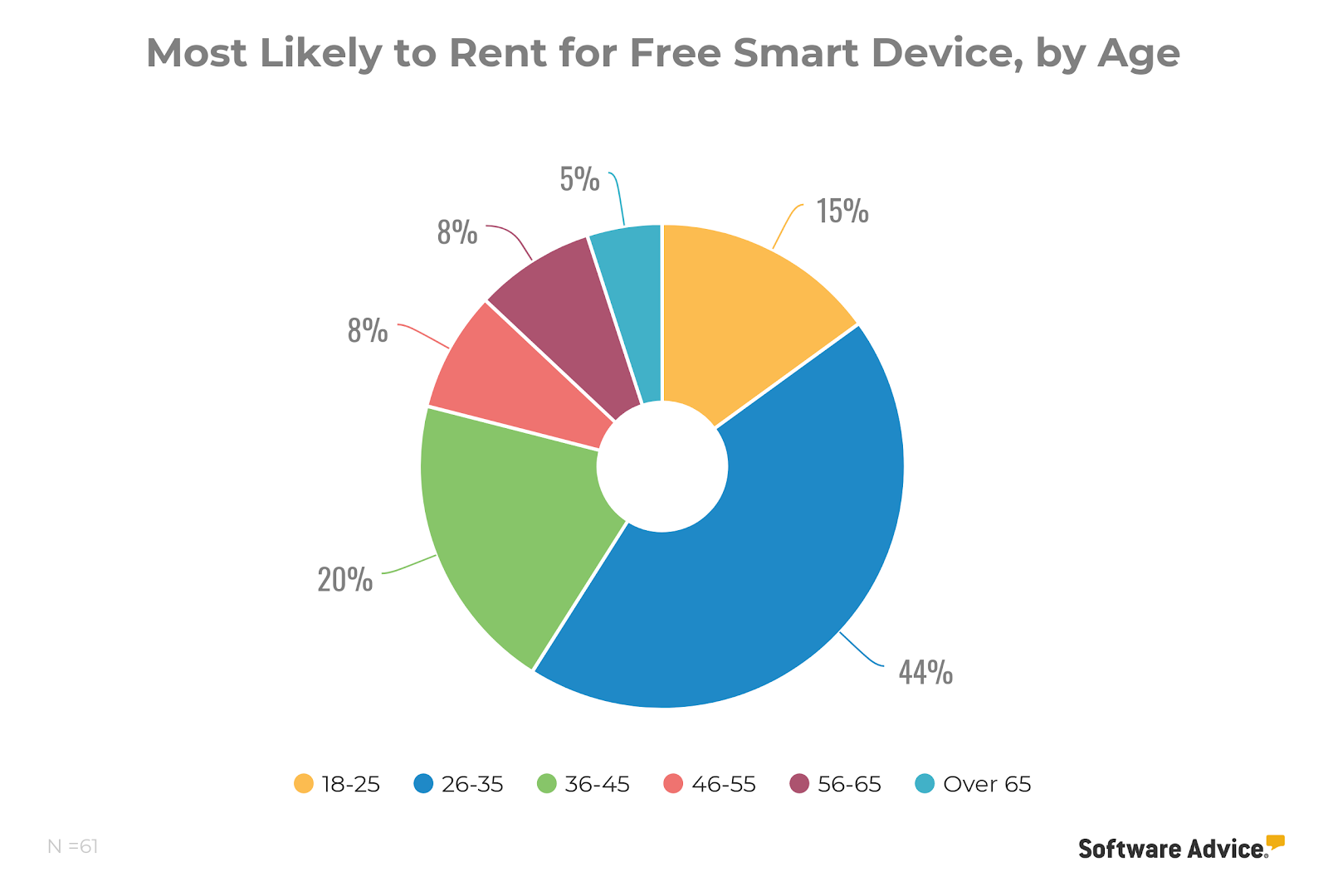Smart Apartments: What Technology Matters to Renters?
The increasing prevalence of smart home technology adoption by consumers offers property managers who integrate it into their listings a marketing advantage, better tenant satisfaction and increased profits.
Smart technology has come a long way since it’s popularization in 2015, and what used to be a steep and expensive barrier of entry is now affordable for nearly any budget.
We asked 335 renters for responses to 10 questions to better understand how property managers could use these popular devices to attract and convince tenants to rent. Here are some of the most important takeaways.
Key Findings:
Half of renters already own a virtual personal assistant (VPA) and find them least likely to compel people to rent.
Improved safety and energy savings are most compelling for potential renters, so focus on highlighting those features.
Nearly half of those who say they’re at least “somewhat more likely” to rent for a free smart device are between the ages of 26-35.
Smart Technology Adoption Rates Continue to Rise
According to Gartner, 85 percent of connected home devices will be part of a connected home ecosystem by 2020 (full research available to Gartner clients). A connected home ecosystem occurs when a home has multiple smart home devices interconnected via VPA or wi-fi.
As a property manager, you’ll need to make sure the smart technology you integrate into your rental properties has a tangible benefit for your renters.
The best way to gain an edge here is by offering up a uniquely valuable device. Here’s a breakdown of what renters have:

Virtual personal assistants, or VPAs, (50 percent) are the most common device already owned by renters, followed by smart lighting (24 percent). Another 32 percent don’t own any smart devices.
Gartner predicted that 15 percent of households (full research available to Gartner clients) will have adopted home automation using smart devices by the end of 2017, and a recent study by Nielsen proved this to be true: 24 percent of people own some sort of virtual personal assistant like Amazon Echo or Google Home.
Because of the high adoption rates of VPAs, you should focus on other smart technology to entice new renters.
When we ran this survey in 2015, only 23 percent of renters surveyed already owned a VPA, so the number of tenants who will be bringing a VPA with them has more than doubled in a short amount of time.
Offering smart home technology that can interface with VPAs will add immense value for a large portion of your tenants by making your property into a connected home ecosystem.
While a large portion of your renters will come equipped with a VPA, some of your tenants will come to your properties without one. The smart home technology discussed below will work without a VPA connected to them, so you’re still adding value for every potential renter by including one or multiple of these technologies.
Energy Savings and Safety Are Most Compelling for Tenants
Although VPAs are popular and fairly inexpensive, they’re probably not going to prompt more interest in your property due to their already-high adoption rate.
Because VPAs don’t offer cost savings for tenants or increase safety, focus on the right smart devices that truly add value to your rental properties instead.
Our findings show that smart devices that offer peace of mind or energy and monetary savings are the most compelling options for renters if included with the apartment or condo.

Give Your Tenants Peace of Mind with Smart Tech
Safety is becoming more important for consumers in 2019, so it’s no surprise tenants are interested in options that allow them to protect both themselves and their property better and smart video monitoring and locks are accessible and realistically attainable for rental properties.
Smart Video Monitoring
Of the options listed in the survey, video monitoring was the most desired by a wide margin. With some form of video monitoring, your tenant can make sure their children, pets, or valuables are safe and sound.
Video monitoring companies often have social media campaigns that ask their users to post interesting or funny everyday moments caught on film.
As a property manager, adopting this strategy in your marketing effort is useful. Shifting the focus away from fear is great because you can market the inclusion of smart video marketing as an added benefit instead of a necessity.
**
Pros
**
• One to two cameras needed for small rentals
• Small and mountable to a wall
• Cheap and accessible
**
Cons
**
• More likely to be broken or misplaced
• Potentially high upkeep
**
Cost
**
• $20 for basic camera
• $40 for camera that pans side-to-side
Including video monitoring inside of a rental property requires trust from your tenant that you won’t use it to monitor their private lives. Because you’ll initially be granting your renter access to view the cameras, they won’t, ultimately, have complete control over the function.
Smart Door Locks
Smart door locks offer a win win for property managers. Your tenants will have improved peace of mind, and the transition between renters will be smoother for you.
Gone are the days of changing out locks between tenants. With a smart lock, all that’s needed is reprogramming the code and you and your new tenant are good to go.
**
Pros
**
• Easier transition between tenants
• Easy to install and set up
• Low upkeep cost
**
Cons
**
• Upfront cost can be high
**
Cost
**
• A smart lock can cost anywhere between $150 and $30
Functionality varies between models, with some of the more pricey options connecting to wi-fi and tracking your phone to unlock as you get near. But a basic smart lock is more than enough for most people.
When the cost of rekeying or replacing a lock entirely is taken into account, installing smart locks can pay for themselves down the line.
Tenants Appreciate Energy Saving Tech
Providing energy efficient options in rentals is a great way to market yourself to younger, more eco-conscious renters. Offering smart tech that uses less energy not only saves your tenants money, but it gives them the peace of mind that their not hurting the environment.
Smart Thermostats
These devices allow you to adjust heating or cooling settings from your smartphones. They also record internal and external temperatures, time the HVAC system has been running and some can even notify you if your air filter needs to be replaced.
Many studies have proven the energy savings achieved by using smart thermostats. Tests on the popular Nest Learning Thermostat show an average of 12 percent savings in electricity for heating.
Like a lot of the other technology discussed so far, smart thermostats are no longer luxury items for the wealthy, and the cost saved will often mean the thermostat will eventually pay for itself.
**
Pros
**
• Cheap and accessible
• Sought after by new tenants
• Easy to install
**
Cons
**
• Upfront cost can be high
• Might be confusing to use for some tenants
**
Cost
**
• A smart thermostat can cost anywhere between $130 and $25
A few years ago, the minimum threshold for smart thermostats was around $300, but now even the most well-known names in the market offer options for under $200.
Smart Lighting
Not only energy efficient, smart lighting also useful for security (lights can be turned on via app to deter theft). By connecting to a smartphone, smart lights allow tenants to turn on their lights remotely so they return to a bright, welcoming space.
More eco-conscious renters will find an apartment or condo outfitted with smart lighting more attractive as well. In fact, LED lights use at least 75 percent less energy than traditional incandescent lights.
**
Pros
**
• Cheaper utility bills for tenants
• Offer extra security for tenants
• Potential tax breaks for installation
**
Cons
**
• Upfront cost can be high
• Most bulbs systems require a central hub to anchor the bulb functionality
**
Cost
**
• $12 per bulb
• Between $150 and 200 for a complete starter kit, which includes hub
Most true smart lighting options require a slightly more expensive hub. A starter kit with 4 bulbs and a hub runs anywhere between $150 and $200 depending on the brand.
Connecting It All Together
A central control panel in your main office could allow management to view and control temperatures and wattage used for lights for all units, and adjust if necessary. This means you can keep tight control over the temperature in vacant units, and help renters program light schedules to significantly cut electric bill costs.
Property managers can implement smart thermostats and lighting systems and promote them as exclusive cost-saving features, giving units an attractive high-tech advantage.
Invest in Smart Technology to Draw Millennial Renters
A survey conducted in 2016 shows that 86 percent of millennials say that they’re willing to pay more for a property fitted with smart technology.
Millennials, those roughly between 18 and 35, make up 60 percent of the renters we surveyed that were most likely to rent for smart technology.

Smart technology is an investment that strongly attracts the largest group of renters, but appeals to nearly any segment, and benefits your business in the long-run.
How Can Smart Technology Drive Interest in My Properties?
Dozens of companies offer smart devices and home automation solutions, like Nest or Honeywell for thermostats. G.E., Philips and even IKEA offer smart bulbs and lighting systems at various levels of sophistication.
For relatively cheaply, you can outfit your rental properties with one or two of the smart technology options above which will lead to less turnover, less vacancies, and higher tenant satisfaction.
After installation, you can use property management software to track the costs and, through integrations, track the energy usage to see how much you and your residents are saving over time.
Finally, you can use property marketing tools to promote these new smart amenities to find new prospective renters.
View our list of top property management software vendors, or give us a call at (844) 688-1783 for a free phone consultation to help narrow down your options.